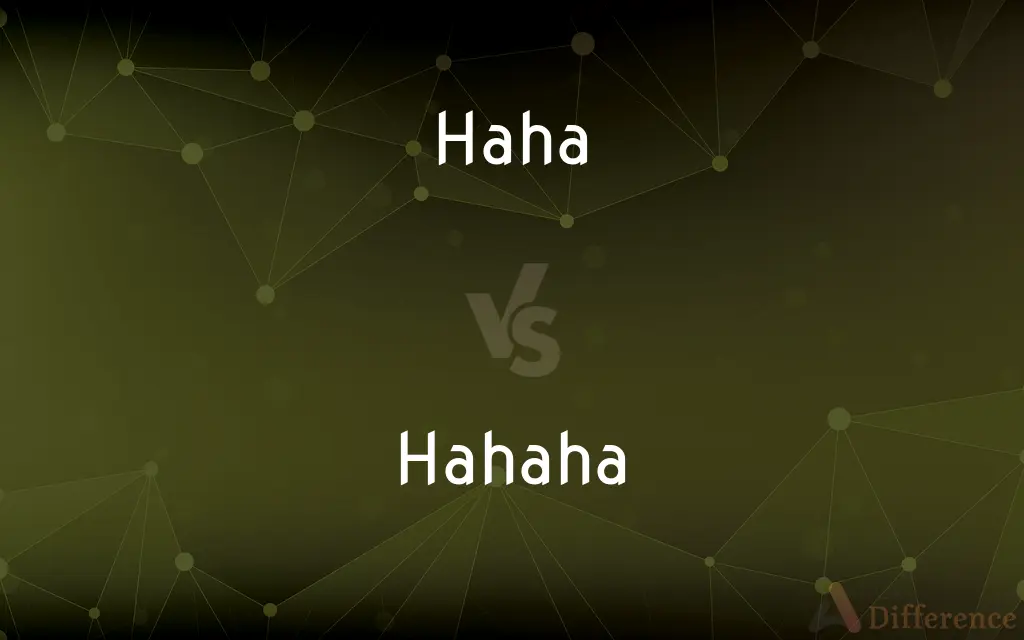Haha vs. Hahaha — What's the Difference?
By Maham Liaqat & Fiza Rafique — Updated on May 17, 2024
Haha indicates amusement or laughter, often in a light or brief manner. Hahaha conveys a stronger, more extended expression of laughter, suggesting greater amusement.

Difference Between Haha and Hahaha
Table of Contents
ADVERTISEMENT
Key Differences
Haha is typically used to express amusement or a mild reaction to something funny. It often appears in casual conversations and can convey a polite chuckle or a brief laugh. Whereas, hahaha indicates a more robust, extended laughter, suggesting that something is genuinely funny or highly amusing.
Haha can be used to acknowledge a joke or light humor without showing deep engagement. Hahaha, on the other hand, shows more enthusiasm and a stronger reaction, often implying that the joke or situation is very funny.
In written communication, haha might be used to convey a small laugh or a polite response to humor. Meanwhile, hahaha suggests a heartier laugh and can be used to emphasize that the humor was more impactful or entertaining.
Haha is often seen in texts or social media to indicate that something is amusing but not necessarily hilarious. Conversely, hahaha can show that the person found the content genuinely hilarious, eliciting a louder or longer laugh.
Haha can sometimes be perceived as a more controlled or reserved expression of laughter. In contrast, hahaha is often seen as a more spontaneous and natural reaction to something funny.
ADVERTISEMENT
In terms of frequency and usage, haha is more common in brief, casual interactions. Whereas, hahaha might be used to show greater appreciation of humor in longer messages or conversations.
Comparison Chart
Intensity of Laughter
Mild, brief
Stronger, extended
Context
Casual, polite chuckle
Genuine amusement, hearty laughter
Enthusiasm
Low to moderate
High
Frequency of Use
Common in brief interactions
Common in extended conversations
Perception
Controlled, reserved
Spontaneous, natural
Compare with Definitions
Haha
A polite chuckle in response to a comment.
Haha, I see what you did there.
Hahaha
Indicates hearty laughter.
Hahaha, that's hilarious!
Haha
Brief laugh indicating mild humor.
Haha, that's quite clever.
Hahaha
Expression of strong amusement.
Hahaha, I can't stop laughing!
Haha
Reaction to something slightly funny.
Haha, good one!
Hahaha
Extended laugh indicating high amusement.
Hahaha, that story was great!
Haha
Expression of mild amusement.
Haha, that was a funny joke.
Hahaha
Shows genuine enjoyment of humor.
Hahaha, you're too funny!
Haha
Light-hearted laughter.
Haha, you're so silly!
Hahaha
Reaction to something very funny.
Hahaha, that made my day!
Haha
An onomatopoeic representation of laughter.
Hahaha
Haha (an onomatopoeic representation of laughter).
Haha
To laugh.
Haha
Type of boundary to a garden, pleasure-ground, or park, designed not to interrupt the view and to be invisible until closely approached.
Common Curiosities
When should I use hahaha?
Use hahaha for stronger, more genuine laughter.
Does hahaha show more enthusiasm?
Yes, it shows greater enthusiasm and amusement.
Is haha less intense than hahaha?
Yes, haha is less intense.
Is haha common in social media?
Yes, it's commonly used in social media.
Is hahaha used to express genuine humor?
Yes, it indicates genuine enjoyment of humor.
Can hahaha imply something is very funny?
Yes, it implies that something is very funny.
When should I use haha?
Use haha for mild amusement or polite chuckles.
Is haha appropriate for brief interactions?
Yes, it's common in brief interactions.
Can haha be seen as a polite response?
Yes, it can be a polite way to acknowledge humor.
Which is more spontaneous, haha or hahaha?
Hahaha is more spontaneous.
Can haha be used in professional settings?
Yes, but typically for light humor.
Does hahaha suggest hearty laughter?
Yes, it suggests heartier laughter.
Does haha indicate mild humor?
Yes, it indicates mild humor.
Is hahaha more appropriate for close friends?
Yes, it's often used with close friends.
Is haha more reserved compared to hahaha?
Yes, haha is more reserved.
Share Your Discovery

Previous Comparison
Schlimazel vs. Schlemiel
Next Comparison
Incubator vs. AutoclaveAuthor Spotlight
Written by
Maham LiaqatCo-written by
Fiza RafiqueFiza Rafique is a skilled content writer at AskDifference.com, where she meticulously refines and enhances written pieces. Drawing from her vast editorial expertise, Fiza ensures clarity, accuracy, and precision in every article. Passionate about language, she continually seeks to elevate the quality of content for readers worldwide.












































